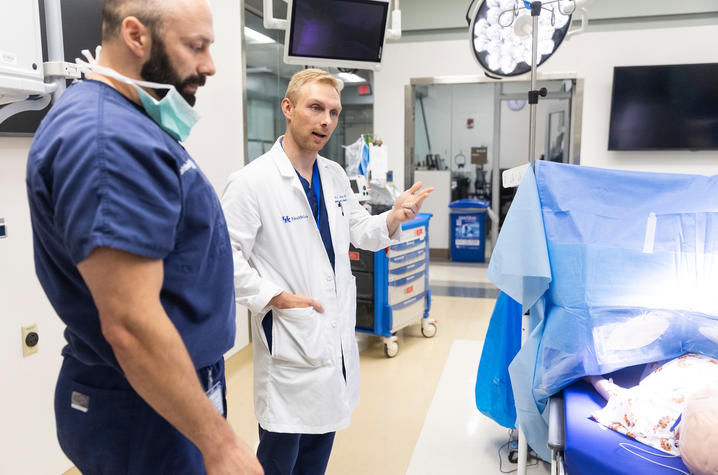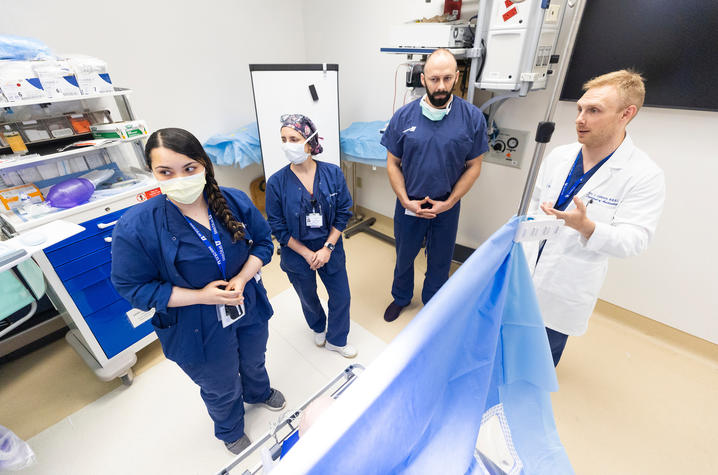Simulation training prepares UK anesthesiology residents for crisis management
LEXINGTON, Ky. (Sept. 26, 2022) — Fortunately for doctors and patients, advancements in medicine and health care have led to fewer medical emergencies. However, for anesthesiologists in training, this also means a reduced number of cases that help them develop proficiency in their field.
Aric Johnson, M.D., helps residents and fellows fulfill that necessary experience through advanced simulation training.
“A kicker doesn’t wait until the game is on the line to try the first field goal. The technique must be practiced before the game in a frequent, consistent manner to perfect the skill,” said Johnson, an assistant professor of anesthesiology in University of Kentucky’s College of Medicine and co-director of simulation in his department. “We allow residents to gain experience with acute, life-threatening pathologies in a simulated environment.”
“With our simulations we essentially try to recreate high-fidelity situations to ensure residents still have that exposure,” Johnson said.
At the UK College of Medicine, residents and fellows use state-of-the-art task trainers: plastic models designed to practice procedures including airway management, virtual bronchoscopy, echocardiography, central line placement and epidural placement. Residents and fellows also utilize part-task trainers and standardized patients.
“Residency is a formative time for physicians, and it is crucial that they sharpen their clinical skills during postgraduate training,” said Zaki Hassan, M.D, chair of anesthesiology. “With our state-of-the-art simulation training and highly skilled faculty, anesthesiology residents at UK receive the vital education necessary to prepare them for real-life clinical scenarios.”
Training takes place at the UK HealthCare Simulation Center, an advanced simulation training hub located on the second floor of Albert B. Chandler Hospital. The center includes a replica of an operating room, as well as an intensive care unit room.
“These rooms contain all of the equipment that would be in the real-life setting,” Johnson said.
Johnson completed his residency training at UK in 2021, and he has a clear recollection of how important simulation training was in honing his skills. He said former program director Annette Rebel, M.D., built a solid foundation for simulation training that benefited him during residency.
In 2011, Rebel helped initiate UK’s annual Anesthesia Olympics, an innovative grant project to evaluate anesthesiology resident skill progression. Residents demonstrate their skills at multiple work stations, and faculty evaluate strengths and skills that could be improved. Just like in the Olympics, residents can earn gold, silver and bronze medals.
Knowing Johnson had a passion for education, Rebel extended him the opportunity to help develop a simulation curriculum. Johnson attended an anesthesia teaching workshop at the Harvard Center for Medical Simulation, and after graduating from residency, began his role as co-director of simulation in 2021, alongside Shira Gambrel, M.D., associate professor of anesthesiology.
The College of Medicine’s Department of Anesthesiology continues to advance its simulation training, recognizing its importance in helping residents and fellows provide optimal patient care. This past year, the department implemented four hours of protected didactic time for residents, including two hours free from clinic and dedicated to simulation training. As of Sept. 1, 2022, Laura Pinault, M.D., is the UK Anesthesiology Residency Program director and is continuing and expanding the simulation program.
“The University of Kentucky recognizes how important simulation training is in improving the clinical skills of future physicians,” Johnson said. “It’s exciting to be a part of it and help grow these efforts.”
As the state’s flagship, land-grant institution, the University of Kentucky exists to advance the Commonwealth. We do that by preparing the next generation of leaders — placing students at the heart of everything we do — and transforming the lives of Kentuckians through education, research and creative work, service and health care. We pride ourselves on being a catalyst for breakthroughs and a force for healing, a place where ingenuity unfolds. It's all made possible by our people — visionaries, disruptors and pioneers — who make up 200 academic programs, a $476.5 million research and development enterprise and a world-class medical center, all on one campus.







